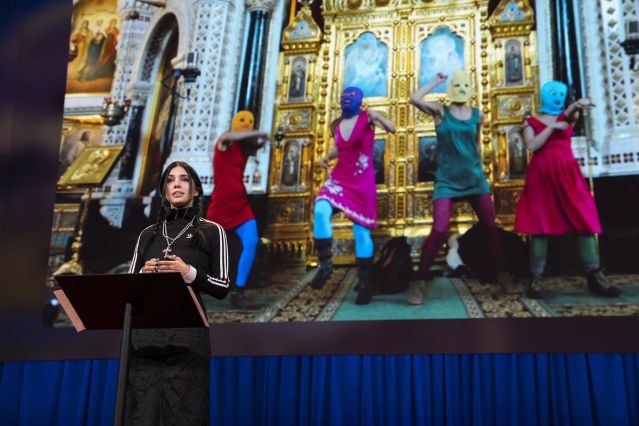Fear
Pussy Riot and the Psychology of Freedom
Courage is the ability to take risks in the face of fear.
Posted May 7, 2023 Reviewed by Hara Estroff Marano
Key points
- Russian performer and activist Nadya Tolokonnikova spoke about courage and her experience in a country without freedom of speech.
- Living in fear is physically and psychologically stressful. It can affect memory, sleep, learning, and even the endocrine and immune systems.
- In the U.S. in certain circles and about certain topics, many people are too fearful of repercussions to publicly reveal their opinions.
- “Cancel culture” is a misnomer. The culture is not one of cancellation. It is a culture of fear.

On August 17, 2012, Nadya Tolokonnikova was sentenced to two years in a Russian prison, convicted of “hooliganism.” She was 22. Her daughter was two.
Going by the provocative name Pussy Riot, Tolokonnikova and other young women, dressed in bright colors and ski masks, had been performing without permits in public squares, government buildings, and shopping malls. As she told an audience at TED in April, they were arrested “almost every single day.”
In response to President Putin announcing that he would, as Tolokonnikova put it, “rule Russia pretty much indefinitely,” Pussy Riot had appeared in Moscow's Cathedral of Christ the Savior on February 21, 2012, and sung the lyrics Virgin Mary, please get rid of Putin. She was convicted for that performance.
Under totalitarian rule, people seem to have no choice. And yet, these young women did not conform. They did not feel hopeless. Something within them compelled them to act. Psychiatrist and Holocaust survivor Viktor Frankl found that in even the most oppressive conditions, “…man does have a choice of action. Man can preserve a vestige of spiritual freedom, of independence of mind…”
“The supreme, sacred, holy rule in Putin's Russia,” Tolokonnikova told the audience, “is to remain afraid.” By breaking that rule, she said, “we disrupted the game as such. We exposed it as a mere game.”
And yet, it is a dangerous game. Along with Tolokonnikova, performers Yekaterina Samutsevich and Masha Alyokhina were also arrested. Tolokonnikova and Alyokhina went to prison. Under a new amnesty law, they were released on December 23, 2013, but until fleeing Russia, they were repeatedly arrested and physically attacked. According to Tolokonnikova, her friends and family continue to be hunted, poisoned, imprisoned, beaten, and murdered. Tolokonnikova is on Russia’s list of “foreign agents” and is on the Russian Interior Ministry's wanted list.
Protesters in Iran face similar consequences, and yet they, too, are willing to put themselves at risk. As Roya Hakakian reported in The Atlantic, Iran’s Supreme Leader Khamenei declared that protesters needed “a punishment in order to recognize their error.” Thousands of protesters have been imprisoned, several executed, and hundreds killed in the street. Even Iranian schoolgirls have been targeted.
Dissenters in Iran, Russia, and in other nondemocratic countries are perceived by those who rule as a threat—not because they have power in the traditional sense but because they claim the extraordinary power of nonviolent free expression. “We all have this power,” Tolokonnikova told the TED audience. “Courage is contagious.”
So is fear. Under despotic rule, more people remain silent than speak up. Fear can be psychologically paralyzing. It shuts down the cerebral cortex (the part of the brain responsible for reasoning) and sets off the release of stress hormones. Living in fear is physically and psychologically stressful. It can affect memory, sleep, learning, and even the endocrine and immune systems. Becoming accustomed to living in fear can result in a feeling of helplessness and psychological resignation. Instead of taking risks, people are more likely to conform.
Despite the far lower risk of expressing dissent in the U.S., in certain circles (higher education in particular) and about certain topics, many people are too fearful of repercussions to publicly reveal their opinions.
Critics of the term “cancel culture” argue that only a small percentage of those targeted for cancellation end up losing their jobs. They are right. But for those who are targeted and later cleared, the process itself is the punishment. Those whose opinions don't conform to the dominant narrative understand they have been warned. Expressing dissent on certain topics comes with a heavy price.
“Cancel culture” is a misnomer. The culture is not one of cancellation. It is a culture of fear. Cancellations are a method of intimidation. The mechanism is what French political philosopher Alexis de Tocqueville called “soft despotism.”
“It covers the surface of society with a network of small, complicated, minute, and uniform rules, which the most original minds and the most vigorous souls cannot break through to go beyond the crowd; it does not break wills, but it softens them, bends them and directs them; it rarely forces action, but it constantly opposes your acting; it does not destroy, it prevents birth; it does not tyrannize, it hinders, it represses, it enervates, it extinguishes, [and] it stupefies...”
Courage is not the absence of fear but the act of putting something at risk in spite of fear. Those who display courage in countries ruled by despots risk their freedom and even their lives. Those who display courage in democratic countries rife with soft despotism risk their social standing, their jobs, their reputations, and their children’s prospects.
Democracy offers the freedom to speak—and even criticize the government—without fear of government sanction. But in order for democracy to be secure, a certain psychology is required of its citizens; one that allows and promotes both the ability to tolerate intellectual and ideological difference and the courage to put ourselves at risk.
Many of us in the West fail to recognize what we sacrifice by being unwilling to take the risks required to reveal our thoughts when we disagree. Not only do we degrade the culture of free speech required for democracy to flourish, when we allow fear to rule us, we are no longer psychologically free.
As Tolokonnikova realized at her sentencing, “We [were] behind the prison bars, but we [were] freer than people who [were] prosecuting us.”




